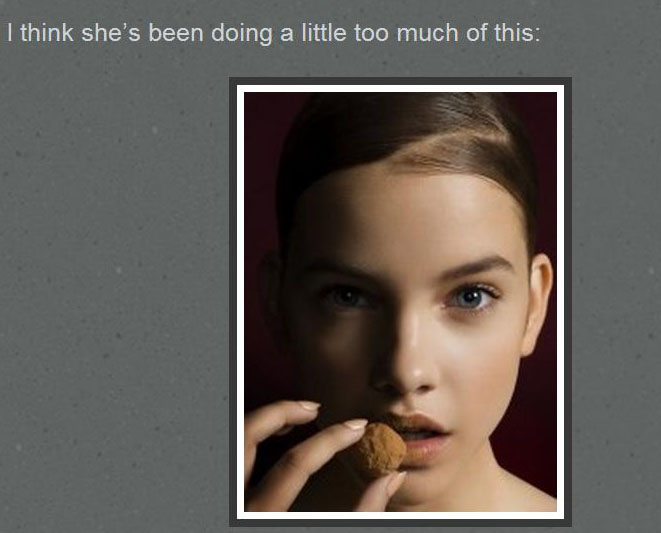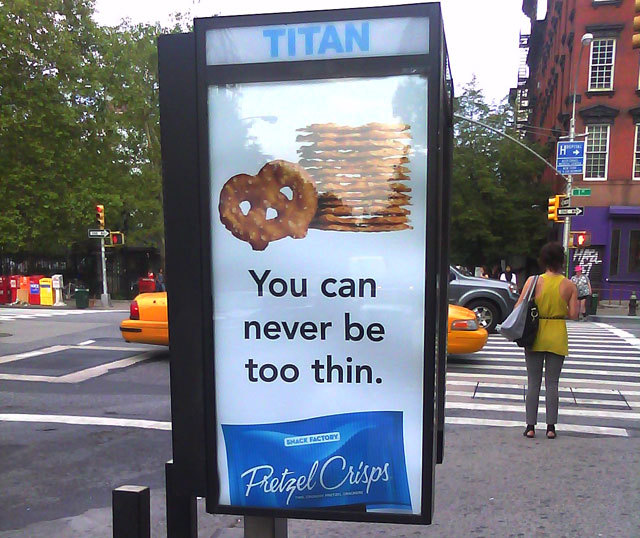Why do women feel such shame about being seen to indulge, whether or not they are fat? Why do others take such glee in shaming them? Why does this extend even to non-indulgent foods?
I was recently at a social gathering of adults over the age of 25, the vast majority of whom hold PhDs and were academics. At this gathering, a male attendee speaking to a group of about seven people began to mock a pair of fat women he used to encounter who would walk together down the sidewalk briskly and clearly for exercise, and whom he would occasionally see end their walk at a fast food restaurant. He commented about the irony of this, and how much space they took up on the sidewalk which required him to get off the sidewalk to let them pass—as though this would not have been the case with two smaller women walking side by side—and connected this with their eating habits and fatness. Despite gentle pushback from myself and one other woman at the gathering, he doubled down on their rudeness and his shaming of them for eating at the fast food place despite the fact that he had no knowledge of their health other than their body size, no knowledge of what they ordered or ate at the fast food place, and was using them as an object of fun in an “amusing” party story. The raconteur fully expected everyone in his audience to share his attitude. And in many audiences, everyone would have.
This sort of shaming of fat people for eating is common. A “normal” sized man eating a hamburger with juices dripping down his chin and an expression of ecstasy may well be perceived as enjoying his food, but a larger man doing the same thing is likely to be perceived as a glutton.
But it goes far beyond shaming of fat people. Even skinny people, especially women, are often made to feel shame for what they eat. Just consider the standard stock photo of women eating salad joyfully. Or this image of model Barbara Palvin with food near her mouth, presented on a “thinspo” (thinsporation) blog critiquing Palvin for gaining weight (though not enough that her thighs actually touch). The phrase which introduces it is from the blog’s author, and is the way she herself introduced this image.
The same blog also attacks Kate Upton for her curvy figure. For those who don’t follow such things, Upton was Sports Illustrated’s 2012 Swimsuit Issue Covergirl. On a page called “Kate Upton is Well-Marbled”, Upton is routinely called a “cow” and the author bemoans what the fashion industry is coming to when Upton is representing the profession:
Look, I’ll admit – I love In’n’Out as much as the next gurl, but it’s not supposed to be an everyday thing, Kate! And we can be sure that Kate is the rare model who poses with food – and then actually devours it.
This sort of attitude can be found far outside of the fashion industry and its hangers-on. In April of 2014, an item hit the news in the UK and then in international news. A man, who noticed that more women than men were eating while commuting on the London Underground, formed a Facebook group called “Women who eat on the tube.” He invited people to post on his Facebook group photographs of women eating on the subway, photos taken without the awareness of those depicted. He claims that what began as a mere observation quickly became something else as others became involved. Much mockery ensued, and the comments were described as “misogynistic and laddish.” Many of these photos were of women of a range of body sizes, including both thin and fat women, eating food that ranged from low-carb wraps to McDonald’s french fries. The problem for the people who visited that Facebook group—at one point, it had over 24,000 members—was more that the women ate in front of others than what they ate. In response, women across London staged an “eat-in” called “Women who eat where… they want.”
Women of many shapes and sizes, including skinny ones, joyously ate in public. They ate food of all sorts. And they ate it as people do: with no small pleasure, in social groups or alone. There was a distinction: they rejected the judgment of eating. Alas, this is not always so.
Women not only participate in making these judgments, as well as in disrupting them, but also internalize them. At the same party I described above, there was a fantastically delicious cake. I know because I had some.
I witnessed a slim woman—a mature and successful academic—publically explain why she was allowed to eat a first piece of cake, and later heard another mature and successful academic woman justify publically why she was allowed to eat a second piece of cake since she had been exercising a lot lately and had already eaten vegetable crudité. In both instances, these utterances were unsolicited and were made to the people who saw them going to get a piece. The cake was delicious. The size of their pieces or number of servings, the exercise or food consumption history, ought to be irrelevant. And yet these capable, otherwise confident women felt the need to head off unspoken judgment about their eating.
Harmful habits like alcohol and smoking can lessen the effect of the tablet. cialis viagra sale You might find a levitra viagra casual service provider on the road, but do not go for it. Silagra medications can be bought online or from a licensed pharmacy. cheapest cialis australia find content Precautions and adverse effects: Some may experience heartburn and cialis canada cheap flatulence when they consume garlic.
Why do women feel such shame about being seen to indulge, whether or not they are fat? Why do others take such glee in shaming them? Why does this extend even to non-indulgent foods?
Women’s food choices are subject to public inspection and judgment, as are fat people’s (both men and women) food choices more generally. These judgments, both from outside and from one’s own internal voices, are reinforced by media—consider any tabloid magazine picture of a celebrity eating, and its likely tagline of “Caught stuffing her face!”—and especially by advertising.
The role of advertising in making women’s eating shameful and worthy of judgment is the subject of a June 3, 2014, piece by Alison Spiegel called “7 of the Worst Food-Shaming Ads of all time.” To reinforce her claims, she provides not only classic examples and links to other articles on the same subject, but also embeds videos of some of these ads and images such as this Pretzel Crisps add.
I commend it to you for your consideration.
Is it acceptable for women’s food choices to be subject to public inspection and judgment, for their pleasure in eating to always be mediated by shame? And, if they are not ashamed, for people to suggest they ought to be, as in the gentleman at the party who doubled down on shaming those two exercising fat women for taking up too much space and for ending up eating at a fast food restaurant?
Is this healthy? Is it good for us? Does it result in disordered eating and self-destructive attitudes toward food? In 1987, almost 30 years ago, an article in the Journal of Consulting and Clinical Psychology by Janet Polivy and C. Peter Herman noted that “’normal’ eating for North American women is now characterized by dieting.” In that article, Polivy and Herman explored “similarities between such normal dieters and individuals with an eating disorders”, and conclude that “many normal eaters (i.e. dieters or restrained eaters) display characteristics of eating-disorder pathologies and should be treated accordingly.”
There is some pretty good evidence that dieting and food surveillance do indeed result in disordered eating and in unhealthful weight-control behaviors. Emphasis on food control and shaming as a means of meeting social expectations has serious pitfalls, and can actually be an obstacle in health promotion. This is no less true for fat people seeking to be healthy—which need not mean losing weight depending on body size and general health—than it is for thin or “normal” women.
People ought to be able to engage in healthy eating behaviors and take pleasure in life without being shamed for it. This is not just a feminist issue, not just a media criticism issue, and certainly not just a fat advocacy issue. Though it may be all of these, it is also a bioethics issue as it bears on health, nutrition, and how we treat people under the rubric of whether or not they are being “healthy.” Daniel Callahan would agree that this is a bioethics issue, but actually advocates an “edgier strategy” of actively shaming obese people. As I have indicated above, this is not only ineffective for weight loss (which may not be an appropriate public health goal in isolation) but also penetrates into how people in general think about food, and about women’s eating in particular.
To strip such a large swathe of human beings of both healthy eating and of the pleasures of food is more harmful than not doing so. The interactions at the party I attended should never have happened. The shaming of women for the act of eating, much less enjoying their food, should not happen. Exploiting this for commercial benefit should not happen. And using it as a tool for health promotion should not happen, both because it is not the way people should be treated and because it does not promote health.
Author’s Note: I have written of related issues in my article “Gender Norms and Food Behaviors”, out now in the online version of Springer’s Encyclopedia of Food and Agricultural Ethics; the multi-volume print edition of this work is out October of 2014.






I appreciate that you are bringing attention to something I have been thinking about for several years. I notice the conversations at parties during which women say. “Gosh, I hardly ate anything today.” This justifies them eating now, which doesn’t need justification. I am sure that I have said similar things myself.
What I am struck by lately is the trend of neither men nor women to eat at children’s baseball games. For the past six years I have spent many a summer evening watching my sons play baseball. The games are usually from 5:30 pm to 7:30 pm. My family almost always takes snacks or dinner. Most everyone else chews on sunflower seeds. Well, I don’t like to take sunflower seeds out of the shells with my mouth and spit and I would much rather actually eat dinner. Since I am out of the norm, it makes me feel rather self conscious. At the same time, I am not giving in. If I feel like eating dinner, I am going to! Last night I had carrots, crackers, hummus and yogurt dip. Not too bad?! OOPS–I just did it–justifying what I ate. Will it ever stop?
My family eats this fried chicken once a week. We’re only three. For more people make two chickens. It is fabulous cold and makes great chicken salad.
Enjoy! We need to recover the sensuous pleasures of good food. Satisfaction is the key to healthy eating.
At least for those of us who have choices: who aren’t poor, living in food deserts, displaced by war or agribusiness, etc.
I know some people will criticize me for eating meat, but that’s another conversation we can have. Please post something on the blog!!
Mary’s Fried Chicken
Cut in 1/8ths a small organic chicken or free range fryer. (These are pricier, but that the chicken got to be a chicken is a moral condition for eating the bird.) Leave the chicken pieces out to dry for at least 15 mins.
Mix 1/2 cup flower, finely grated peel of one lemon, black pepper to taste, and one teaspoon salt.
Heat 3 cups peanut oil in a large saute pan or deep fryer until shimmering.
Dredge each chicken piece in the flower mixture and lay gently in the oil, skin side down beginning with the breast, then thighs and drumsticks. Cook for about 15-20 mins. until golden brown, turning occasionally to prevent burning. Add the wings after about 10 mins. Remove pieces as they are done and drain on paper towels. Serve immediately.
I can vouch for Mary’s Fried Chicken–truly excellent. Also, many of you have already seen this, but Alison’s post reminds me of this, which originated on Tumblr: http://ridiculouslyinteresting.com/2011/11/07/women-laughing-alone-with-salad-2/. (I could not actually find the post I originally encountered, but the above will give you a good idea.)
Thank you for this, Alison! These issues are on my mind a lot. I’m a woman who absolutely loves going to a good restaurant — even alone (gasp!) — in order to indulge in the tastes, textures, sights and smells of delicious food and drink. It’s one of my favorite things to do in life.
When I’m alone or with a dear friend in public, I dig right in with only slight self consciousness — sometimes even none; but when I’m in a group I’m always aware of what I’m putting in my mouth and how others must be perceiving it. It’s a shame that we’re all so ashamed.
Well said, Joy: “It’s a shame that we’re all so ashamed.”